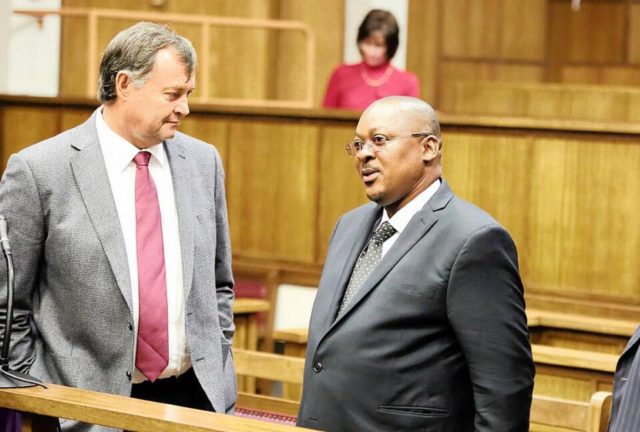Internal processes are still underway and case management committees are preparing profiles of inmates eligible for consideration.
THE Justice and Correctional Services Department has not declared the disgraced former ANC Northern Cape leader John Block eligible for parole due to the outbreak of Covid-19 in prisons despite widespread speculation in his political circles.
Speculation of his release grew this week following the address by Justice Minister Ronald Lamola to the justice portfolio committee this week. Detailing categories of those likely to be released – Lamola said a total number of 14 300 inmates were due for parole in the next two years.
Lamola also said another group consisting of 4 500 inmates who are due for parole in two years or more will form part of 19 000 of inmates President Cyril Ramaphosa had recommended to be released on parole due to the outbreak of Covid-19 in the country – prisoners were also prone to the disease.
According to Lamola’s explanation – Block and his fellow convict Trifecta boss Christo Scholtz do not qualify for early parole.
The two were found guilty of fraud, corruption and money laundering in October 2015. The Northern Cape High Court previously found that Block had corruptly used his political influence to ensure that Scholtz’ Trifecta group of companies was awarded lease agreements with various Northern Cape government departments between 2006 and 2008.
In exchange, Block received gratifications, including two payments of R228 000 and R500 000, which the SCA held were “solely” for the purpose of concluding the lease agreements with Trifecta.
They were each sentenced to an effective jail term of 15 years in accordance with the Criminal Procedure Amendment Act of 1998 which prescribed minimum sentences for white collar and organised crime offenders during the tenure of former President Nelson Mandela.
After the conviction and sentenced, while out on extended bail both petitioned the Supreme Court of Appeal and the Constitutional Court to set aside their conviction and sentence.
The SCA ruled against them in August 2018 saying that a message needed to be sent out that corruption would not be tolerated. The ConCourt made a similar ruling in November 2018.
Both handed themselves over to the correctional authorities in November 2018 and have to date only served 18 months of their respective 15-year jail terms.
On Tuesday, however, as speculation intensified about Block’s release, Correctional Services national spokesperson Singabakho Nxumalo was unable to deny or confirm it.
In his reply, Nxumalo said: “We are still busy with internal processes. Case management committees are preparing profiles of inmates eligible for consideration.
“We are therefore not at a stage where centres have a list of those that are to go before parole boards,” Nxumalo said.
He, however, said parole placement was aimed at addressing health and hygienic challenges within overcrowded South African correctional facilities.
“With the total inmate population of 156 000, an outbreak in DCS facilities would be catastrophic. Some of the correctional facilities are more than 100% overpopulated and, as a consequence, it will be difficult to address, manage and prevent the spread of COVID-19 within them,” Nxumalo said.
In his own statement, Nxumalo said the Northern Cape has an overpopulation of 0.45% – the lowest figure in the country.
Nxumalo said: “In our regions, the Eastern Cape has the highest prevalence of overcrowding at 54,88%, Gauteng follows with 52.10%, Limpopo, Mpumalanga and North West region stands at 39.18%, Western Cape stands at 29.08%, KwaZulu-Natal stands at 25.97% and Free State and Northern Cape region is at 0.45%.”








